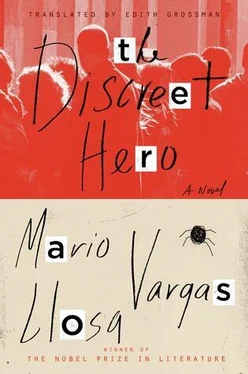“I didn’t see anything, I never see the things that are going to happen. Didn’t I tell you that? I just had an inspiration that if you got into that truck, something could happen to you. I didn’t know what. I never know what it is that’s going to happen. Just that there are things it’s better not to do because they’ll turn out bad. Are you going to eat that tamale and drink your Inca Kola?”
They’d been friends since then and soon began to use familiar address with each other. When Señora Adelaida left the settlement at kilometer 50 and opened her little shop selling herbs, notions, odds and ends, and religious images in the area near the old slaughterhouse, Felícito came by at least once a week to say hello and chat for a while. He almost always brought a little present — some candy, a cake, sandals — and when he left he placed a bill in her hands, as hard and callused as a man’s. He’d consulted her about all the important decisions he’d made in those twenty-some years, especially since the establishment of Narihualá Transport: the debts he assumed, the trucks, buses, and cars he bought, the places he rented, the drivers, mechanics, and clerks he hired or fired. Most of the time, Adelaida laughed at his questions. “Hey waddya think, Felícito, what do I know about that? How can I tell you if a Chevrolet or a Ford is better, how can I tell you about the makes of cars if I’ve never had one and never will?” But from time to time, though she didn’t know what it was about, she’d have an inspiration and give him some advice: “Yes, get into that, Felícito, it’ll be good for you, I think.” Or “No, Felícito, that’s not a good idea. I don’t know what it is but something about it smells bad.” For him the words of the holy woman were revealed truths, and he obeyed them to the letter, no matter how incomprehensible or absurd they might seem.
“You fell asleep, baby,” he heard her say.
It was true, he’d dozed off after drinking the glass of cool water Adelaida had brought him. How long had he been nodding in the hard rocking chair that gave him a cramp in his rear end? He looked at his watch. Good, just a few minutes.
“It was all the tension this morning, the running around,” he said, getting to his feet. “See you soon, Adelaida. Your shop is so peaceful. It always does me good to visit you, even if you don’t have an inspiration.”
And at the very instant he said the key word “inspiration,” which Adelaida used to define the mysterious faculty she’d been given, foretelling the good or bad things that were going to happen to some people, Felícito noticed that the holy woman’s expression had changed since she’d said hello, listened to him read the spider letter, and assured him it inspired no reaction at all in her. She was very serious now: Her expression was somber, she was frowning and biting a fingernail. One might say she was controlling an anguish that had begun to paralyze her. She kept her large eyes fastened on him. Felícito felt his heart beat faster.
“What is it, Adelaida?” he asked in alarm. “Don’t tell me that now…”
Her callused hand took him by the arm and her fingers dug into him.
“Give them what they ask for, Felícito,” she murmured. “It’s better if you give it to them.”
“Give five hundred dollars a month to extortionists so they won’t do me any harm?” He was scandalized. “Is that what your inspiration is telling you, Adelaida?”
The holy woman released his arm and patted it affectionately.
“I know it’s wrong, I know it’s a lot of dough,” she agreed. “But after all, what difference does money make, right? Your health is more important, your peace of mind, your work, your family, your little girlfriend in Castilla. Well, I know you don’t like me telling you that. I don’t like it either, you’re a good friend, baby. Besides, I’m probably wrong, I’m probably giving you bad advice. You have no reason to believe me, Felícito.”
“It isn’t the dough, Adelaida,” he said firmly. “A man shouldn’t let anybody walk all over him in this life. That’s what it’s about, that’s all, comadrita.”
When Don Ismael Carrera, the owner of the insurance company, stopped by his office and suggested having lunch together, Rigoberto thought, “He’s going to ask me again to change my mind,” because Ismael, along with all his colleagues and subordinates, had been startled by Rigoberto’s unexpected announcement that he’d take his retirement three years early. Why retire at the age of sixty-two, they all said, when he could stay three more years in the manager’s position that he filled with the unanimous respect of the firm’s almost three hundred employees.
“And really, why, why?” he thought. He wasn’t even sure. But the truth was that his determination was immovable. He wouldn’t take a step backward, even though by retiring before the age of sixty-five, he wouldn’t keep his full salary or have any right to all the indemnities and privileges of those who retired when they reached the upper age limit.
He tried to cheer himself by thinking of the free time he’d have. Spending hours in his small space of civilization, protected against barbarism, looking at his beloved etchings and the art books that crowded his library, listening to good music, taking a trip to Europe once a year with Lucrecia in the spring or fall, attending festivals, art fairs, visiting museums, foundations, galleries, seeing again his best-loved paintings and sculptures and discovering others that he would bring into his secret art gallery. He’d made calculations, and he was good at math. By spending judiciously and prudently administering his almost million dollars of savings, as well as his pension, he and Lucrecia would have a very comfortable old age and be able to secure Fonchito’s future.
“Yes, yes,” he thought, “a long, cultured, and happy old age.” Why then, in spite of this promising future, did he feel so uneasy? Was it Edilberto Torres or anticipatory melancholy? Especially when, as now, he looked over the portraits and diplomas hanging on the walls in his office, the books lined up on two shelves, his desk meticulously arranged with its notebooks, pencils and pencil holders, calculator, reports, turned-on computer, and the television set always tuned to Bloomberg with the stock market quotations. How could he feel anticipatory nostalgia for this? The only important things in his office were the pictures of Lucrecia and Fonchito — newborn, child, adolescent — which he would take with him on the day of the move. As for the rest, soon this old building on Jirón Carabaya, in the center of Lima, would no longer be the insurance company’s headquarters. The new location, in San Isidro, on the edge of the Zanjón, was almost finished. This ugly edifice, where he’d worked for thirty years of his life, would probably be torn down.
He thought Ismael would take him, as always when he invited him to lunch, to the Club Nacional and he, once again, would be incapable of resisting the temptation of that enormous steak breaded with tacu-tacu they called “a sheet,” or of drinking a couple of glasses of wine — so that for the rest of the afternoon he’d feel bloated and dyspeptic, and lack all desire to work. To his surprise, when they got into the Mercedes-Benz in the building’s garage, his boss told the driver, “To Miraflores, Narciso, La Rosa Náutica.” Turning to Rigoberto, he explained, “It will do us good to breathe a little sea air and listen to the gulls screeching.”
“If you think you’re going to bribe me with a lunch, Ismael, you’re crazy,” he warned him. “I’m retiring no matter what, even if you put a pistol to my head.”
Читать дальше

![Гарри Гаррисон - Bill, the Galactic Hero [= The Starsloggers]](/books/87536/garri-garrison-bill-the-galactic-hero-the-star-thumb.webp)










